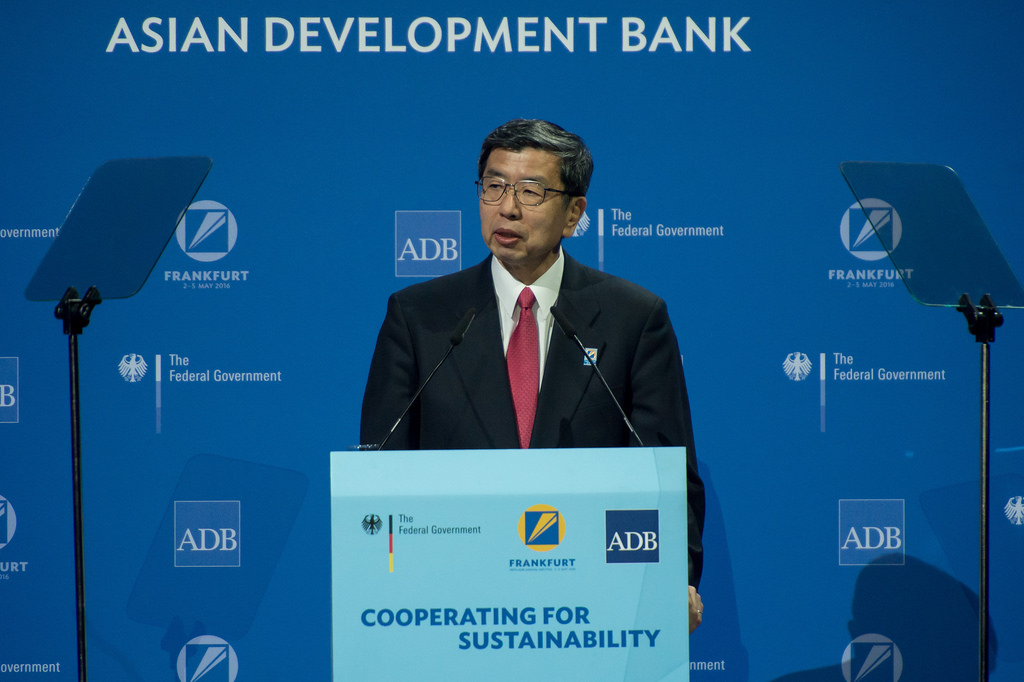


 Annual meetings of the Board of Governors of the Asian Development Bank (ADB) have become a premier forum for the discussion of economic and social development issues in Asia and the Pacific. The meetings provide excellent opportunity for member governments to interact with ADB staff, non-governmental organizations (NGOs), media, and representatives of observer countries, international organizations, academia and the private sector to discuss current issues and challenges that the region of Asia is facing, with the goal of identifying possible solutions.
Annual meetings of the Board of Governors of the Asian Development Bank (ADB) have become a premier forum for the discussion of economic and social development issues in Asia and the Pacific. The meetings provide excellent opportunity for member governments to interact with ADB staff, non-governmental organizations (NGOs), media, and representatives of observer countries, international organizations, academia and the private sector to discuss current issues and challenges that the region of Asia is facing, with the goal of identifying possible solutions.
“Creating quality jobs, developing the private sector, and combating climate change are critical for a vibrant and sustainable region,” Asian Development Bank (ADB) President Takehiko Nakao said in his opening remarks at the 49th Annual Meeting of ADB’s Board of Governors held on May 2-5, in Frankfurt (Germany). In welcoming the meeting participants, Mr. Nakao was followed by Horst Köhler, the former President of Germany and former head of the International Monetary Fund and Gerd Müller Federal, Minister for Economic Cooperation and Development, Germany. The meeting was attended by 3,000 representatives from all over the world. (Highlights of the 49th Annual Meeting).
From Georgia, IDFI Director Giorgi Kldiashvili was invited to participate in the panel: Space for Civic Society Engagement in Implementation of Sustainable Development Goals: will it Shrink or Expand? Six Panelists discussed topics such as strategies and options for constructive engagement in pursuit of UN’s Agenda 2030 and the Sustainable Development Goals (SDG) processes, sources of funding for CSOs in middle and low income countries, and the role of multilateral development banks in supporting CSO engagement in SDG implementation and monitoring.
In his speech on “OGP and Civil Society: how to Develop UN Sustainable Development Goals” Kldiashvili pointed out that the Open Government Partnership (OGP) is one of the most efficient platforms in the world that can support the sustainable development of the nations.
Speaking about the Georgian experience, he emphasized that in order to support the implementation of Agenda 2030, the government and the civil society need a common platform where they can share their ideas and support the implementation of the Agenda 2030. Not only the Government, but also the NGO sector should also endorse the OGP Joint Declaration on Open Government for the Implementation of the 2030 Agenda; “this will be an illustration that NGOs, together with governments, share the same belief and support the implementation of the sustainable development goals.”
According to Giorgi Kldiashvili, it was recognized that after the elaboration of the Sustainable Development Goals, a considerable part of OGP experts concentrated their attention on the 16th goal of the Sustainable Development Agenda – Peace, Justice and Strong Institutions. “This goal was identified as one of the most relevant targets for the OGP, since it aims to improve the public services and promote integrity in all state institutions. However, we would like to express a different opinion on this matter for three reasons: First, OGP is directly related to all goals of the Sustainable Development Agenda. This is evidenced by the action plan commitments of the OGP member countries. Second, OGP’s focus on a single goal of Sustainable Development poses a risk that its member countries may direct all of their efforts towards a single goal and ignore the other ones. This could result in a failure to bring together the objectives of the Sustainable Development Agenda and those of the OGP. Third, we believe that it is impossible for an OGP member state to elaborate an Action Plan that is not in line with the Sustainable Development Agenda, since an action plan developed around OGP principles inevitably supports the implementation of the Sustainable Development Agenda as well.”
Among the panel members also were John Clark, a member of the Independent Review Panel of the International NGO Accountability Charter, member of the supervisory board of the European Center for Not-for-profit Law, and principal of The Policy Practice; Agnieszka Kroskowska, Gender Focal Person and Myanmar Country Representative, Helvetas; Anselmo LeeBoard Member, CIVICUS and Secretary General, Asia Democracy Network; and Suzanne Siskel, Executive Vice President and Chief Operating Officer, Asia Foundation. Vinay Bhargava, Chief Technical Adviser, Partnership for Transparency Fund served as the moderator of the panel.
This year marks ADB’s 50-year anniversary. ADB is preparing a publication on ADB’s 50 years of partnership with its members, and about Asia’s remarkable development experiences over this period. The Government of Japan will host ADBs next annual gathering in the city of Yokohama. The meeting will be held from 4 to 7 May 2017.